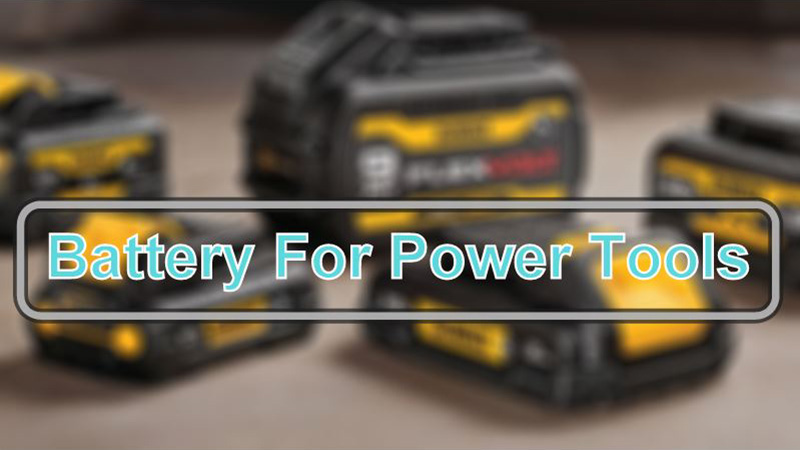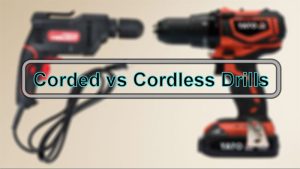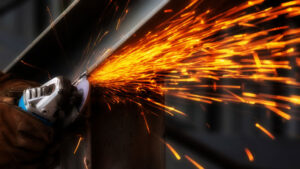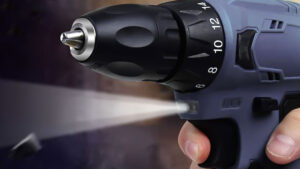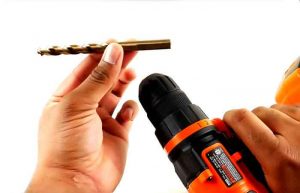Power tools are a must-have for both professional and DIY enthusiasts. They make work easier, faster, and more efficient. But power tools are only as good as the battery that powers them. With so many types of batteries on the market, it can be challenging to choose the right one for your power tools. In this article, we will explore the best type of battery for power tools.
Type of Battery For Power Tools
Before we dive into the best type of battery for power tools, it’s important to understand the different types of batteries available.
- Nickel Cadmium (NiCad) Batteries
- Nickel-Metal Hydride (NiMH) Batteries
- Lithium-Ion (Li-ion) Batteries
1. Nickel Cadmium (NiCad) Batteries
Nickel Cadmium batteries have been around for decades and were once the go-to battery for power tools. They are known for their durability, but they are heavy and have a limited lifespan. They also contain toxic chemicals, which makes them harmful to the environment.
Advantages and Disadvantages of Nickel Cadmium (NiCad) Batteries
Here’s a table summarizing the advantages and disadvantages of Nickel Cadmium (NiCad) batteries:
| Advantages | Disadvantages |
|---|---|
| 1. Durable | 1. Heavy |
| 2. Can be recharged quickly | 2. Limited lifespan |
| 3. Can withstand extreme temperatures | 3. Harmful to the environment |
| 4. Low cost compared to other battery types | |
| 5. Good performance at high discharge rates | |
| 6. Holds charge well when not in use | |
| 7. Easy to find and widely available |
2. Nickel-Metal Hydride (NiMH) Batteries
Nickel-Metal Hydride batteries are an improvement over NiCad batteries. They are more environmentally friendly and have a longer lifespan. They also weigh less and have a higher energy density, which means they can provide more power.
Advantages and Disadvantages of Nickel-Metal Hydride (NiMH) Batteries table
Here’s a table summarizing the advantages and disadvantages of Nickel-Metal Hydride (NiMH) batteries:
| Advantages | Disadvantages |
|---|---|
| 1. More environmentally friendly than NiCad batteries | 1. Lower energy density than Li-ion batteries |
| 2. Longer lifespan than NiCad batteries | 2. Can lose their charge quickly when not in use |
| 3. Weigh less than NiCad batteries | |
| 4. No toxic chemicals, making them safer for the environment | |
| 5. Affordable price compared to Li-ion batteries |
3. Lithium-Ion (Li-ion) Batteries
Lithium-Ion batteries are the most popular type of battery for power tools. They are lightweight, have a long lifespan, and can hold their charge for a long time. They also have a high energy density, which means they can provide a lot of power. However, they are more expensive than NiCad and NiMH batteries.
Advantages and Disadvantages of Lithium-Ion (Li-ion) Batteries
| Advantages | Disadvantages |
|---|---|
| 1. Lightweight and compact | 1. More expensive than NiCad and NiMH batteries |
| 2. Long lifespan compared to other battery types | 2. Can be damaged if not charged or stored properly |
| 3. Hold their charge for a long time | 3. Can be dangerous if damaged or punctured |
| 4. High energy density, providing more power | |
| 5. No memory effect, meaning they can be charged at any time | |
| 6. Low self-discharge rate, making them suitable for infrequent use | |
| 7. Fast charging time | |
| 8. Environmentally friendly and recyclable |
Choosing the Best Battery for Your Power Tools
Choosing the best battery for your power tools is an important decision that can affect the performance and efficiency of your tools. Here are 10 factors to consider when choosing the best battery for your power tools:
- Battery voltage: Choose a battery with a voltage that matches the voltage rating of your power tool. Using a battery with a different voltage rating can damage your tool and reduce its performance.
- Battery capacity: Battery capacity is measured in ampere-hours (Ah) and indicates how long the battery can provide power to your tool before needing to be recharged. Choose a battery with a capacity that meets your needs for runtime.
- Battery type: Consider the advantages and disadvantages of different battery types, such as Li-ion, Ni-Cd, and Ni-MH batteries, and choose the one that best suits your needs.
- Battery weight: Lighter batteries are more comfortable to use, especially for extended periods, and can reduce fatigue.
- Battery size: Make sure the battery fits your tool’s battery compartment and doesn’t obstruct the tool’s handling or balance.
- Charging time: Choose a battery that can be charged quickly and efficiently, especially if you need to recharge frequently.
- Price: Compare the prices of different battery brands and types and choose the one that offers the best value for money.
- Warranty: Look for batteries with a warranty that covers defects and premature failure, and choose a brand with a good reputation for quality and reliability.
- Brand compatibility: Choose a battery that is compatible with your power tool brand to ensure proper fit and performance.
- User reviews: Read user reviews and ratings of different battery brands and types to get a better idea of their performance, reliability, and customer satisfaction.
Maintaining Your Battery
Proper maintenance is important to ensure the longevity and performance of your power tool battery. Here are 10 tips for maintaining your battery:
- Charge the battery fully before first use and after each use to prevent battery memory effect and to maximize runtime.
- Store the battery in a cool, dry place away from direct sunlight, heat, or moisture to prevent degradation and damage.
- Avoid storing the battery in a fully discharged state for long periods, as this can cause permanent damage.
- Use the battery regularly, as long periods of inactivity can cause the battery to self-discharge and lose capacity.
- Clean the battery contacts and terminals with a dry cloth or brush to prevent corrosion and ensure proper electrical connection.
- Use the battery only with compatible chargers and power tools to prevent damage and ensure optimal performance.
- Avoid overcharging or undercharging the battery, as this can damage the battery and reduce its lifespan.
- Replace the battery if it shows signs of damage, such as cracks, leaks, or deformation, or if it no longer holds a charge.
- Dispose of the battery properly according to local regulations, as batteries can be hazardous to the environment if not recycled or disposed of properly.
- Follow the manufacturer’s instructions and recommendations for battery maintenance and usage to ensure optimal performance and safety.
By following these tips, you can maintain your power tool battery and ensure optimal performance, runtime, and lifespan.
Final Words
Choosing the right type of battery for your power tools is crucial for their performance and longevity. While NiCad batteries may have been the go-to in the past, Lithium-Ion batteries are now the most popular choice due to their lightweight, long lifespan, and high energy density. However, they are more expensive than other types of batteries. When choosing a battery, consider compatibility, capacity, voltage, and cost. Finally, to get the most out of your battery, maintain it properly by charging and storing it correctly, using it regularly, and keeping it clean.
FAQs
What is the best type of battery for power tools?
Answer: Lithium-Ion (Li-ion) batteries are the most popular and considered the best type of battery for power tools due to their lightweight, long lifespan, and high energy density.
Are NiCad batteries still used for power tools?
Answer: While NiCad batteries are less commonly used for power tools than in the past, some power tools still use NiCad batteries.
How long do NiCad batteries last?
Answer: NiCad batteries have a limited lifespan, usually around 500 to 1000 charging cycles.
Are NiMH batteries better than NiCad batteries?
Answer: Yes, NiMH batteries are an improvement over NiCad batteries as they are more environmentally friendly, have a longer lifespan, and weigh less.
Can I use a Li-ion battery in a tool that requires a NiCad or NiMH battery?
Answer: It’s important to check the manufacturer’s instructions to ensure compatibility, but in some cases, Li-ion batteries can be used in tools that require NiCad or NiMH batteries with the use of an adapter.
How long do Li-ion batteries last?
Answer: Li-ion batteries can last for several years, with a lifespan of around 500 to 1000 charging cycles.
Can I overcharge my battery?
Answer: Overcharging a battery can damage it and reduce its lifespan, so it’s important to follow the manufacturer’s instructions for charging and not to leave the battery charging for an extended period.
Can I store my battery in a cold place?
Answer: Yes, you can store your battery in a cool, dry place, but avoid storing it in a place with high humidity or direct sunlight.
How do I dispose of my old battery?
Answer: It’s important to dispose of old batteries properly, as they can be harmful to the environment. Many hardware stores and recycling centers accept old batteries for proper disposal.
Can I mix and match different types of batteries in my tool?
Answer: It’s not recommended to mix and match different types of batteries in your tool as it can damage the tool and reduce its performance. Always use the battery type recommended by the manufacturer.
